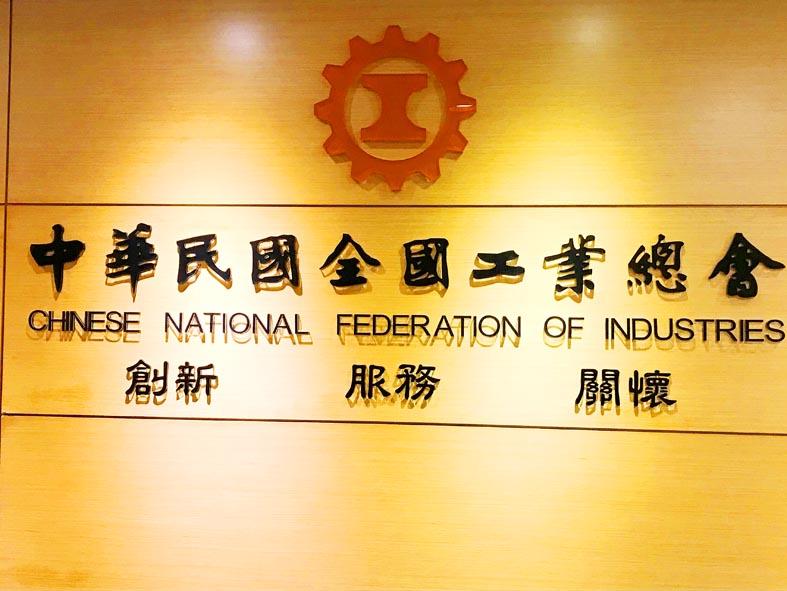The government should help local firms boost competitiveness, while building Taiwan into a hub for high-end technology patents, research and development, and corporate operating facilities, a trade group said in a paper released yesterday.
The Chinese National Federation of Industries’ (CNFI, 全國工業總會) annual position paper said that the COVID-19 pandemic challenges globalization and realigns electronics supply chains, which would benefit Taiwan and bolster its importance on the world stage, it said.
The group, which consists of 159 associations and represents a majority of local manufacturing firms, said the government should monitor an imbalance in growth between large corporations and small and medium-sized enterprises.

Photo: Lee Ya-wen, Taipei Times
Large corporations can help smaller businesses expand in the US and European markets, and create clusters that can benefit all, the paper said, adding that overconcentration in a few sectors would deepen the imbalance and be unfavorable for talent recruitment, the development of renewable energy sources and other economic issues.
Petrochemical and metal manufacturers, for instance, could pursue digital transformation, aided by artificial intelligence and Internet of Things solutions, it said.
Policymakers can support the process by offering favorable tax rates and other incentives to encourage industrial upgrades and innovation.
The government should also adopt forward-looking positions to tackle issues linked to climate change in light of the nation’s worst water shortage in 50 years in the first half of this year, it added.
A stable water supply is crucial for chipmakers and other manufacturers, it said, adding that the manufacturing industry accounts for only 10 percent of Taiwan’s water usage.
The government should also take bold steps to make water management policies supported by scientific feasibility, it said.
The trade group said that Taiwan should be pragmatic and equally cordial in its dealings with the US and China as the world’s two largest economies cut economic dependence on each other.
Electronics shipments to China last year amounted to US$63.5 billion, greater than the US$47 billion in shipments destined to the US, the group said.
Although China-bound investment declined, local firms based in the Chinese market grew more profitable, meriting the need to pursue cross-strait peace, it said.
The government must also take quick and effective action to address the nation’s low fertility rate, which would soon evolve into a national security problem after the number of deaths surpassed births last year, it said.
The trend is worrying, as financial burdens are growing for middle-aged people who have to raise children while caring for their ailing parents, it added.

Taiwan Semiconductor Manufacturing Co (TSMC, 台積電), the world’s biggest contract chipmaker, booked its first-ever profit from its Arizona subsidiary in the first half of this year, four years after operations began, a company financial statement showed. Wholly owned by TSMC, the Arizona unit contributed NT$4.52 billion (US$150.1 million) in net profit, compared with a loss of NT$4.34 billion a year earlier, the statement showed. The company attributed the turnaround to strong market demand and high factory utilization. The Arizona unit counts Apple Inc, Nvidia Corp and Advanced Micro Devices Inc among its major customers. The firm’s first fab in Arizona began high-volume production

VOTE OF CONFIDENCE: The Japanese company is adding Intel to an investment portfolio that includes artificial intelligence linchpins Nvidia Corp and TSMC Softbank Group Corp agreed to buy US$2 billion of Intel Corp stock, a surprise deal to shore up a struggling US name while boosting its own chip ambitions. The Japanese company, which is adding Intel to an investment portfolio that includes artificial intelligence (AI) linchpins Nvidia Corp and Taiwan Semiconductor Manufacturing Co (TSMC, 台積電), is to pay US$23 a share — a small discount to Intel’s last close. Shares of the US chipmaker, which would issue new stock to Softbank, surged more than 5 percent in after-hours trading. Softbank’s stock fell as much as 5.4 percent on Tuesday in Tokyo, its

COLLABORATION: Softbank would supply manufacturing gear to the factory, and a joint venture would make AI data center equipment, Young Liu said Hon Hai Precision Industry Co (鴻海精密) would operate a US factory owned by Softbank Group Corp, setting up what is in the running to be the first manufacturing site in the Japanese company’s US$500 billion Stargate venture with OpenAI and Oracle Corp. Softbank is acquiring Hon Hai’s electric-vehicle plant in Ohio, but the Taiwanese company would continue to run the complex after turning it into an artificial intelligence (AI) server production plant, Hon Hai chairman Young Liu (劉揚偉) said yesterday. Softbank would supply manufacturing gear to the factory, and a joint venture between the two companies would make AI data

DOLLAR SIGNS: The central bank rejected claims that the NT dollar had appreciated 10 percentage points more than the yen or the won against the greenback The New Taiwan dollar yesterday fell for a sixth day to its weakest level in three months, driven by equity-related outflows and reactions to an economics official’s exchange rate remarks. The NT dollar slid NT$0.197, or 0.65 percent, to close at NT$30.505 per US dollar, central bank data showed. The local currency has depreciated 1.97 percent so far this month, ranking as the weakest performer among Asian currencies. Dealers attributed the retreat to foreign investors wiring capital gains and dividends abroad after taking profit in local shares. They also pointed to reports that Washington might consider taking equity stakes in chipmakers, including Taiwan Semiconductor